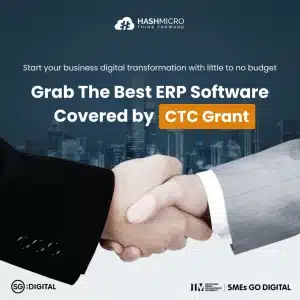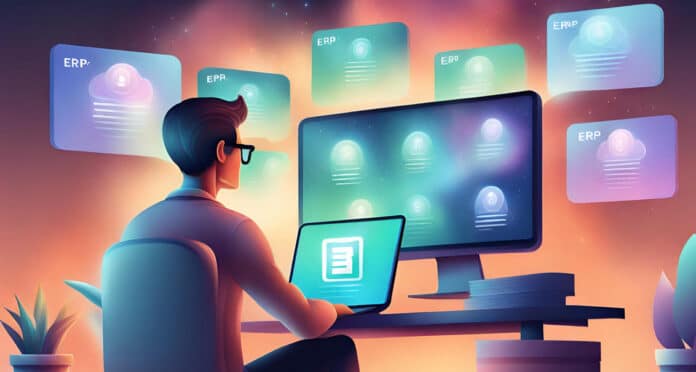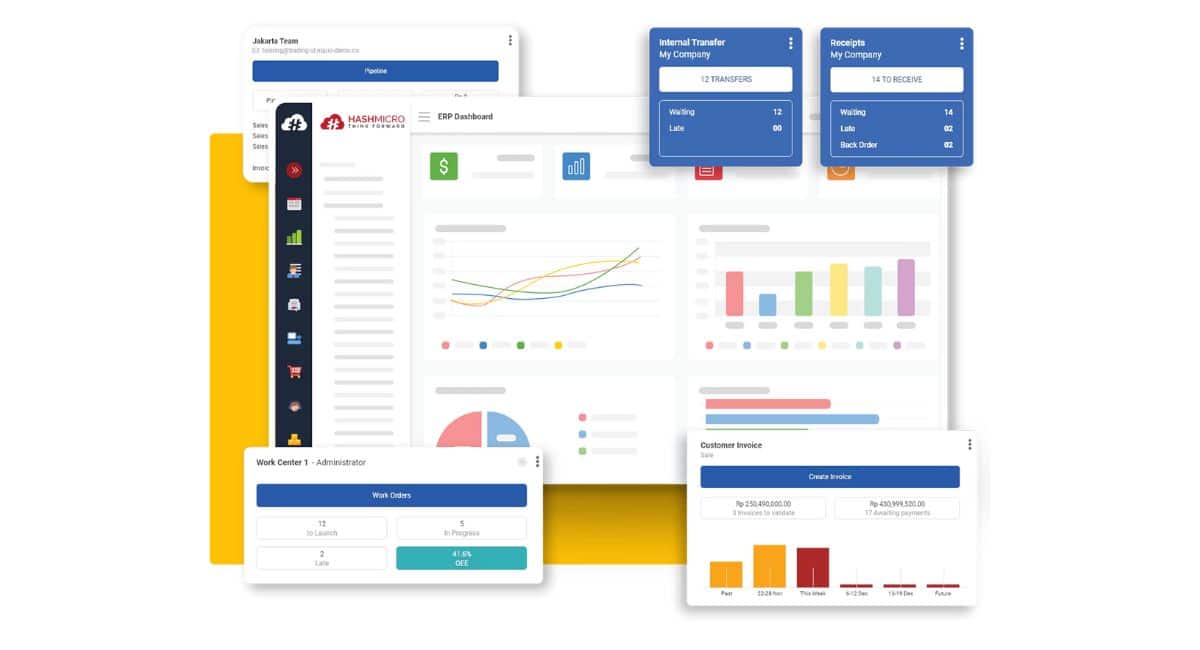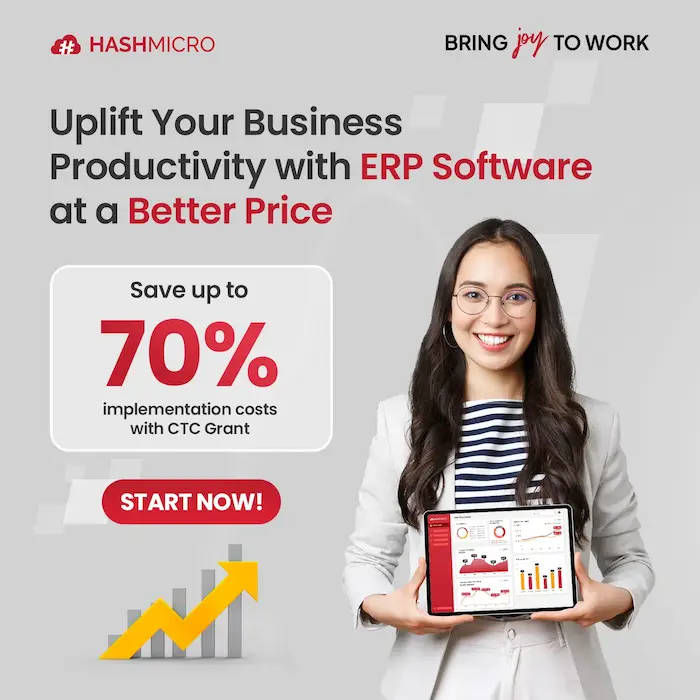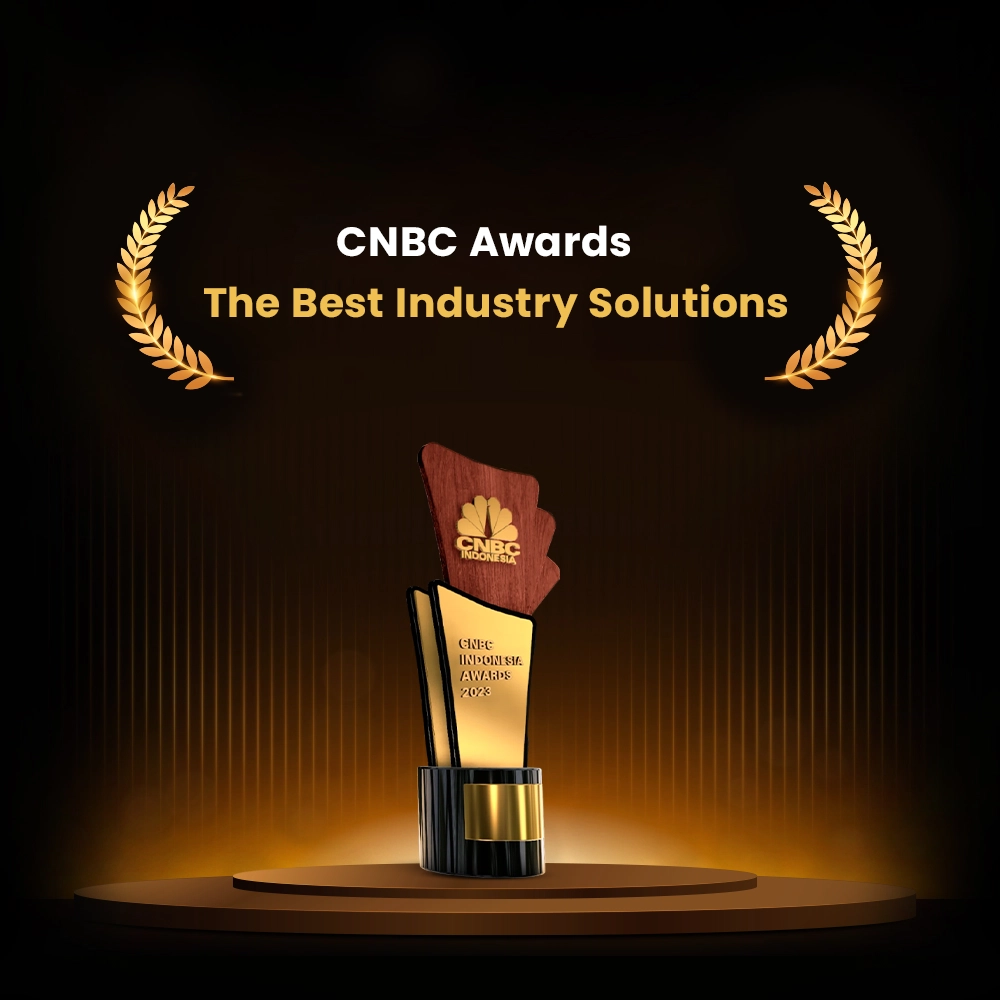ERP or Enterprise Resource Planning is a software system designed to integrate and manage business processes in a centralized and automated way. Many businesses are using ERP nowadays and as today’s technology is rapidly evolving, they now have the option to choose between cloud ERP and on-premise ERP.
What are they and what’s the difference? Cloud ERP vs. on-premise, which is the best solution for your business? In this article, we will explore their differences in detail.
Key Takeaways
|
Table of Content:
Table of Content

Definition of ERP
What is ERP? In general, ERP or Enterprise Resource Planning is a software solution to help companies or businesses with managing their operations. With this system, you can handle a wide range of core business processes like procurement, accounting, inventory management, human resources, and more.
Implementing ERP can improve your business’s decision-making, collaboration, efficiency, and customer satisfaction. Therefore, it is crucial for businesses to adopt ERP systems for their survival and long-term success.
The Pros and Cons of Cloud vs. On-Premise ERP
With the increasing popularity of ERP, many businesses are choosing between a cloud-based and an on-premise one. After all, this is a critical decision for businesses. While both options have their advantages and drawbacks, it is essential to weigh the pros and cons of cloud vs. on-premise ERP. This is to make an informed decision that fits your business’s unique needs.
Cloud ERP
When you hear the term ‘cloud,’ it means you’re talking about storing data and running applications from the internet, not from servers in your office.
This ERP system stores all its data and applications on a cloud server managed by the service provider, allowing users to access the system from anywhere as long as there’s an internet connection.
Imagine the ease of accessing all your office data and systems with just one click on your laptop or phone, without worrying about upgrades or other technical issues. This is at the core of what cloud-based ERPs offer: a solution that provides exceptional flexibility and efficiency in managing your business operations.
For further details about the cloud ERP itself, you can read here.
Advantages of Cloud-Based ERP System:
- Accessibility and Scalability: With a cloud-based ERP, you can access data and systems from anywhere, facilitating collaboration and work mobility. Moreover, as your business grows, you can easily increase capacity or features without experiencing downtime or lengthy processes.
- Automatic Updates: Like a tree growing and flourishing without needing your daily watering. Vendors routinely provide updates, keeping your system running smoothly without your direct involvement.
- Maintained Security: Consider this as a strong defense fortress for your data. Cloud providers usually come equipped with encryption and advanced security features to protect your data. Therefore, it’s crucial to ensure the extent of data security protection offered by your vendor.
- Customization Options: Many cloud-based ERP vendors (such as HashMicro, for example) offer modules that can be fully customized to fit business needs, along with the ability to integrate with various other systems, ensuring smooth and efficient business workflow.
Disadvantages of Cloud-Based ERP System:
- Requires Stable Internet Connection: Internet Connectivity Dependency: Despite offering access flexibility, without a stable internet connection, you might face difficulty accessing the system. This could hinder productivity in certain situations.
On-premise ERP
An on-premise ERP is a system model that you install directly on hardware and servers within your business environment.
Opting for an on-premise ERP can be an ideal solution, especially if your office is situated in an area with an unstable internet connection. This is because this type of ERP system features remote access, allowing you to access it from anywhere, even when the internet connection faces disruptions.
However, there are other aspects to consider before choosing this system. In the following explanation, we’ll outline the advantages and disadvantages of an on-premise ERP system so that you can make an informed decision that aligns with your business needs.
Advantages of On-Premise ERP System:
- Full Control: Companies have complete control over the entire ERP system, including data management, configuration, and security.
- Data Security: Since data is stored on your company’s server, you have full control over its security, including access policies and backups.
- Performance and Stability: Without reliance on internet connectivity, on-premise ERP systems typically offer reasonably good performance.
Disadvantages of On-Premise ERP System:
- Significant Investment Costs: Implementing this type of ERP requires a considerable initial investment for servers, along with the necessary hardware purchases. This means that the Return on Investment (ROI) tends to occur over a longer period.
- Risk of Data Loss: If the company’s local server encounters issues or if there’s an unstable internet connection, there’s a potential risk of data loss unless an effective backup system is in place.
- System Maintenance: You’re responsible for maintaining, updating, and troubleshooting the system, which requires an internal IT team or contracting with a third party. Additionally, making changes or upgrades to the system in the future might require additional investment and a lengthy process.
- Infrastructure Dependency: If there’s damage to your hardware or server, there’s potential for prolonged downtime until the issue is resolved.
For a pricing scheme of ERP software, you can click the image below.
<
The Difference Between On-Premise and Cloud ERP
When it comes to ERP systems, one of the first decisions to make is whether to go with on-premise or cloud-based solutions. This requires careful consideration of various factors as it is not a one-size-fits-all decision.
Therefore as more and more businesses have come to utilize ERP, it is important to understand the fundamental differences between cloud ERP and on-premise ERP.
Cloud ERP operates by storing data and applications on a remote server managed by the service provider, enabling seamless access from anywhere with an internet connection.
Its hallmark lies in offering unparalleled flexibility and efficiency in managing business operations. Accessibility, scalability, automatic updates, robust security measures, and customizable options are among its key advantages.
Conversely, on-premise ERP involves installing the system directly onto in-house hardware and servers. It’s an optimal choice, particularly in areas with erratic internet connectivity, as it allows remote access even during disruptions.
Its advantages stem from full control over data, enhanced security measures, and stable performance due to independence from internet reliance. However, it incurs significant initial investment costs and demands dedicated resources for maintenance and upgrades.
Summary:
| Cloud ERP | On-Premise ERP |
| Data and applications are stored on remote servers. | Installed directly onto in-house hardware and servers. |
| Accessibility from anywhere with internet connectivity. | Accessible even in areas with unstable internet. |
| Provider-managed updates and system maintenance. | Requires dedicated in-house maintenance and updates. |
| Scalable with flexibility for increased capacity easily. | Limited scalability; capacity expansions involve hardware upgrades. |
| Relies on the provider’s security measures. | Offers enhanced data security through in-house control. |
| Pay-as-you-go subscription or usage-based pricing model. | Higher upfront costs due to server and hardware investments. |
Which One Should You Choose? Cloud ERP vs. On-Premise
Now that we know the differences between cloud ERP and on-premise ERP, which one is better? It depends on your business’s type and needs. However, Cloud ERP has become increasingly popular in recent years due to its many benefits.
Overall, cloud ERP is a more powerful tool than on-premise ERP that can help businesses of all sizes and industries streamline their operations, increase efficiency, and ultimately, grow their business.
The Best Cloud ERP for Your Business: Hash Core ERP
As there are so many cloud ERP vendors and providers, how do you choose the best one? Well, the most recommended cloud ERP in Singapore is HashMicro’s Hash Core ERP, trusted by over 1,750 businesses and companies from various industries.
It is a cloud-based ERP system that offers a comprehensive range of solutions including accounting, CRM, HRM, procurement, inventory, and more systems in one platform. The software allows for improved productivity and optimized business process operations.
With features like business process automation and easy access to data, users can make smarter decisions for their business’s growth. The system is also customizable to meet the unique needs of each industry and company.
Hash CORE ERP is designed to help businesses of all sizes automate various business processes with its modules and features. This cloud-based system is accessible anywhere, anytime, and with any device, making it easy to monitor end-to-end operational business activities.
Furthermore, this cloud-based Hash CORE ERP has very reasonable prices and if you are still unsure about the system, you can also try out the demo of this cloud ERP for free.
Conclusion
To conclude, while each type of ERP has its differences with its own pros and cons, cloud ERP is more suggested to use. Other than it is more popular, cloud-based ERP is more beneficial.
One of the best examples of cloud-based ERPs is Hash CORE ERP, owned by HashMicro. Even before implementation, you can surely gain many benefits, such as free demo, CTC grants, and affordable prices. For consultations and more information regarding HashMicro’s cloud-based Hash CORE ERP, you can kindly click here or the image below.




